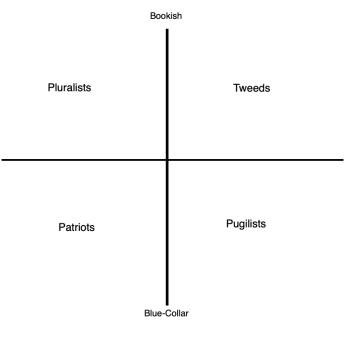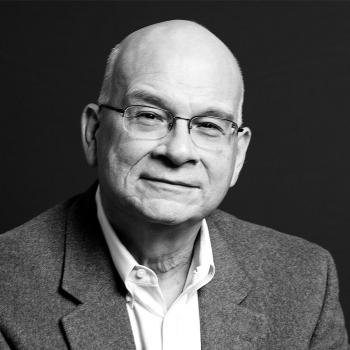 A few days ago, my wife and I settled in to watch Shaka King’s film Judas and the Black Messiah, which chronicles the little-known story of an FBI informant tasked with penetrating into the inner circle of Fred Hampton, leader of the Black Panther Party in Chicago during the 1970s. As a Black man himself, the informant is profoundly conflicted about the role he plays in Hampton’s eventual killing—a guilt that, the film leads us to believe, contributed to his eventual suicide.
A few days ago, my wife and I settled in to watch Shaka King’s film Judas and the Black Messiah, which chronicles the little-known story of an FBI informant tasked with penetrating into the inner circle of Fred Hampton, leader of the Black Panther Party in Chicago during the 1970s. As a Black man himself, the informant is profoundly conflicted about the role he plays in Hampton’s eventual killing—a guilt that, the film leads us to believe, contributed to his eventual suicide.
As interesting and compelling as the movie is, I still have to admit that the film doesn’t quite do justice to the persistent question that haunts me every time I encounter a story of informants or double agents. Simply put, when all is said and done, how long can one inhabit an “undercover” role before becoming the part they play? If, as Maurice Merleau-Ponty, Michel Foucault, and so many others have taught, the practices carried out by the body are integral sites for the production of knowledge—and thereby the formation of the self—how long can one salute an alien flag, profess a hostile creed, or hobnob with enemy folk without eventually losing one’s stable sense of personal identity? Imagine you were sent to infiltrate the Soviet Union or Maoist China during the Cold War: could you ever truly—under cover of a “part you’re playing”—befriend other people and become a fixure in their lives without those relationships becoming tinged with genuine sincerity, without becoming conditioned to see their own hopes and dreams and values in the best possible light?
The only movie that, to my mind, has ever come close to reflecting this tension is the 1957 WWII classic The Bridge on the River Kwai, in which a group of Allied prisoners of war are directed by their Japanese captors to construct a bridge that will connect the cities of Bangkok and Rangoon. Previous efforts to build this bridge have proven unsuccessful, but one of the captives, Colonel Nicholson (Alec Guinness, in one of his best roles) decides to do better—to make the best of a suboptimal situation and construct a proper bridge that will stand the test of time. Eventually, with the bridge close to completion—and set to be christened by a passing train of eminent Japanese leaders—some of the Allied men devise a daring plan to rig the newly constructed bridge with explosives in a bid to cripple the Japanese war effort. But at the utmost, Nicholson cannot bring himself to destroy his handiwork; despite his intellectual awareness that he, as an Allied soldier, ought to resist the Japanese wherever possible, something visceral within him recoils at the thought of destroying this beautiful thing that he and others have made.
I grew up watching dozens of old movies like Bridge, and yet Nicholson’s final hesitation remains one of the most striking moments I can recall. And as I’ve gotten older, I’ve come to see it as a testament to the overwhelming power of the human psyche to compellingly rationalize its own betrayal of its highest ideals—something vaguely akin to Frodo’s final moment of weakness at the Crack of Doom. (To crib from a yet another author, this is the moral question that Shusaku Endo’s novel Silence leaves so hauntingly unresolved: can one “participate in the suffering and death of Christ” by betraying the name of Christ?) This impulse, I think, is a universal one: in a situation of genuine crisis, more than anything we want to believe we are acting consistently with our professed values, even when the tension between our ideals and our real-world actions seems to strain all credulity. We want to believe, in short, that we are as authentic as we claim to be.
My increasing consciousness of this temptation probably explains why, over the years, I’ve grown to have a particular kind of negative reaction to one of the practices that, in various online circles, is described as “deconstruction.” In the simplest and most benign sense, this refers to the process by which someone raised within the community of Christian faith comes to challenge and reject certain formulations of their prior convictions—for instance, the view that the Bible is always absolutely clear and always offers a ready answer to whatever moral question one might ask of it. In practice, though, this “deconstruction” more often tends to look like an increasing cognizance of the incompatibility of aspects of their childhood faith with their nascent (usually political) value commitments—and where those principles are in tension, the former typically must give way to the latter, demanding that the faith be reinterpreted or reconceptualized in a way that supports one’s emergent ideological convictions.
At the risk of being overly cynical, I suppose we could describe elements of this process in Nietzschean terms as a “transvaluation of values.” I would hasten to add, though, that in many cases “deconstruction” isn’t the same as deconversion: in many cases, this process is accompanied by an enduring allegiance to what is seen as a kind of Christian kerygma, or fundamental proclamation, beneath the institutional accretions of centuries past. That kerygma, in many cases, tends to be the universal love exemplified by Jesus Himself.
I won’t pretend that I’m unfamiliar with this impulse: in years past, I spent plenty of hours being frustrated with what I perceived to be rampant legalism, hidebound doctrinal formulations incapable of speaking meaningfully to present conditions, and much else. But a few years removed from these controversies, I’ve realized something else: that there is only so long that one can coherently profess the name of Christ and simultaneously vent at excruciating length against His Body, the Church that comprises saints and sinners alike.
It’s one thing to speak prophetically and urge the Church back toward its Savior; it’s quite another to rationalize the most savage, poisonous rhetoric on offer on the assumption that you speak for a higher, purer morality—a better Christianity than the one given to you. To my mind, this tends to become a pristine example of the habit or practice of Silence-style behavior, of somehow perceiving oneself as an “undercover” true Christian dwelling among the most merciless critics of the faith—believing you can personally retain a sincere faith in Christ while spending day upon day blasting institutional “Christianity” online or among friends. This, I would suggest, is self-deception; it is a poison that, in the end, leads ultimately to the spiritually deadened state that might be called the ironic disposition.
The only way back from this place of self-assurance leads through the wilderness. In my own case, it took eight straight months of brutal suffering and total alienation from Christian community—from which I was, in the end, delivered in a series of events I can only ever describe as providential. And in the depths of that abyss, it was not my subjective experience of my own “Christian-ness” that offered a sure anchor; it was the Apostle’s Creed and the Lord’s Prayer, those central elements of Luther’s Small Catechism that came down to me through the very institutional Church I had grown so proficient at critiquing.
I suppose in the end my point is this: one can never, even in the depths of frustration or despair, believe themselves to be so much better than the Church they claim to urge to a higher standard. The only Christian life worth living is a sincere and humble one—one that does not attempt to posit an ironic lacuna between individual and community, but that sees oneself and all one’s deficiencies as inextricably bound up with that very community.
Any other path, ultimately, leads into darkness.












